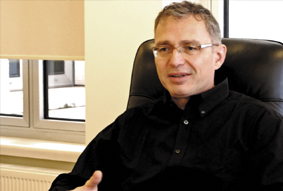
Joining us on our Interviews with the Faculty Members pages, this issue is the new dean of the Faculty of Arts and Social Sciences. With a successful career from basketball to engineering, economy and the TÜBİTAK Science Award, Mehmet Baç talks to us on his background, award, the financial crisis, world policies and art.
Following a high school diploma from the St. Michel French High School, Dr. Mehmet Baç received a BSc from the Electrical Engineering and Telecommunication Department of Istanbul Technical University in 1983. Baç received a master's degree in Economics from Boğaziçi University in 1986, and a doctorate degree from the Université Laval in Quebec, Canada in 1990. Baç has been giving lectures on game theory and economics at Sabancı University since 2002, and is currently the Dean of the Faculty of Arts and Social Sciences (FASS). Baç was most recently granted a TÜBİTAK Science Award for his "extraordinary international achievement in the design of an inspection, reward and penalty system to prevent authority abuse cases such as corruption and bribery in institutions in microeconomics".
Economics was a coincidence
Did you choose electrical engineering on purpose?
It was my first choice at the university exam. But I was hardly 18; nothing was “knowingly” at the time. We weren’t lucky as you are; we couldn’t change our program once we began. After three years, you just can’t go back; you want to see it through. In the end, 60% of it was lost time. I had always been more interested in science, but I did enjoy social subjects too. I wasn’t able to make a distinction between natural and social sciences for myself back then, and I still can’t. That’s why I chose a social science that has a large natural science aspect into it.
How and why did you choose economics?
It was a coincidence really. I was well into sports those days. I was a semi-professional player in the basketball team of Galatasaray. I wasn’t able to attend laboratory classes due to practices. My engineering theory wasn’t bad; I could compete with others. But my practice was weak since I missed all laboratory classes. Then I did a few internships. I was told that my soldering was really awful. In fact, one of the workers there told me off one day because of my handiwork. I blew my top and finished my internship elsewhere. Thanks to these internships, I decided I wasn’t going to become an engineer. The engineers there toiled from 9 to 6; they could only spare themselves an hour or two on weekends. And they were paid peanuts. I didn’t want to be one of them. This is how I gave up on electric engineering.
It was an intense period, leading up to 1980. The military intervention and all cost me a few more years. Social issues had always been of interest to me. I tried to decide between administration and economics, and found myself going for economics. I loved the subject as I did my master’s, and decided to go for postgraduate. These wouldn’t even have crossed my mind 3-4 years ago. But the times have changed. I see people who plan their postgraduate education 10 years in advance.
You mentioned playing basketball at university. In fact, the "Ekşi Sözlük" website calls you "the İbrahim Kutluay of his day". Do you still play basketball?
It must be quite an old "student" that remembers both periods. I still do play at the Sports Hall. Last night I shot a few rounds. The place was deserted because of the football match. The school is crowded now, so the Sports Hall is packed in the evenings.
I’m always under surveillance!
Your studies and courses are on game theory. Do you make up game theories in your everyday life, and solve problems through such theories?
I must be under the influence of the concept. You don’t realize it right off the bat, but it must be the case. I think all economics students are somewhat under the influence of this, because of their education. At the very least, there is something called experimental economics, which includes suggestions like "this is how people behave under such conditions". Game theory has these kinds of suggestions, too. These are tested with real subjects. You must have heard of the Prisoner’s Dilemma. To test these theories, they sit people down in front of computers and make them choose what they would do in various conditions. They make sure that subjects are not economics students because they know how to think strategically. They know how the person opposite them will think, and they think accordingly. Working on these subjects does instill a degree of unwanted distrust for the people around you. You begin to view them differently. For instance, there is a clock that sits at the top of the oven in our kitchen; it turns out that my wife set it a few minutes late the other day. And then, when I was hurrying to get my little one prepared for school, my wife turns around and says, "Don't panic; the clock is five minutes fast anyway," proving that we have been defeated by our own rationality.







